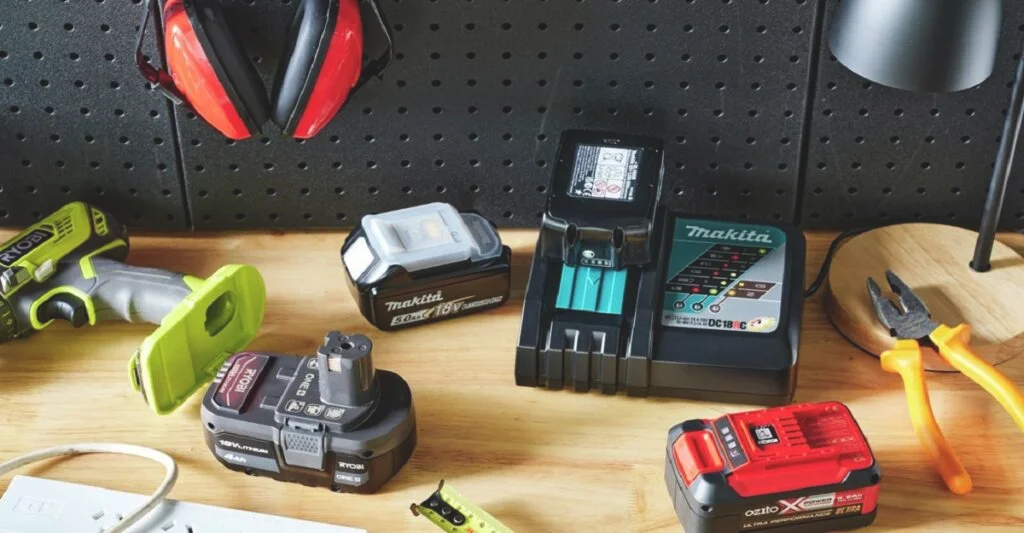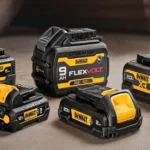Lithium-ion batteries have become an integral part of our daily lives, powering everything from smartphones and laptops to electric vehicles. While they offer convenience and efficiency, concerns about safely storing lithium batteries in the house have also increased.
In this article, we will explore the best practices for storing lithium-ion power tool batteries and discuss the proper conditions for storage.
How To Store Lithium-Ion Batteries When Not In Use?
Lithium-ion batteries require special care when not in use to ensure their longevity and performance. Here are some guidelines on how to store them effectively:
| Parameter | Best Practices |
| Charge Level Considerations | Between 40% to 80% |
| Temperature And Environment | Between 15°C and 25°C (59°F and 77°F) |
| Avoid Deep Discharge | Recharge batteries once they drop to about 20% to 30%. |
| Regular Check-Ups | Every 3 to 6 months and recharge if needed |
| Avoid Physical Damage | Handle them with care and keep out of children’s reach. |
| Risk of Short-circuiting | Avoid contact with metal objects that could short-circuit the battery. |
| Insulation | Use a fireproof container and keep them in a dry, ventilated area |
| Disposal | Regular inspection and ensure proper disposal upon damage immediately. |
16 Best Ways To Store Lithium Ion Power Tool Batteries
Charge Level Considerations

- Unlike other battery types, lithium-ion batteries should not be stored fully charged and completely drained. For long-term storage, always store them with a charge level between 40% and 80%.
- Storing lithium-ion batteries fully charged can reduce capacity while storing them completely discharged may cause the battery to fall into a deep discharge state, rendering it unusable.
Temperature And Environment
- Store batteries in a cool, dry place, away from direct sunlight and heat sources. A temperature range between 15°C and 25°C (59°F and 77°F) is ideal.
- Extreme temperatures can negatively impact battery performance, so avoid exposing them to temperatures below freezing or above 86°F (30°C).
Use Original Packaging Or Cases
- While leaving batteries inside the power tool might be convenient, long-term storage might not be advisable. The tool may unintentionally draw power from the battery or expose it to different environmental conditions.
- Whenever possible, use the original packaging or a designated battery case to protect batteries to avoid contact with metal objects that could short-circuit the battery.
- Remove the battery from the tool after use and store it separately.
Regular Check-Ups
- Periodically check the charge level every 3 to 6 months and recharge them if needed. Make sure 2 LEDs are lit on your battery before storing.
- Use a damp cloth to clean the dust and soil off the batteries as dirt accumulation can affect their performance.
Avoid Deep Discharge
- Lithium-ion batteries are designed to avoid deep discharges (when the voltage drops too low), which can lead to permanent damage.
- Avoid using the battery until it’s completely drained. Recharge batteries once they drop to about 20% to 30%.
- If a battery enters a deep discharge state, you may not be able to charge it back to full capacity, leading to a significant loss in performance.
Use Manufacturer-Approved Chargers
- Using a charger not approved by the manufacturer or a substandard one can harm your battery’s performance. Use the recommended charger for your specific battery.
- Avoid leaving the battery on the charger once it’s fully charged to prevent excess heat buildup, even if the charger has an automatic shut-off feature.
- Lithium-ion batteries lose 5-10% charge each month. Thus, for longer storage periods, it is necessary to charge them to about 60% every 6-10 months.
Get the best deals on lithium-ion chargers
Avoid Physical Damage
- Lithium-ion batteries are sensitive to physical damage, which can compromise their safety and performance. Handle batteries with care and avoid dropping or crushing them.
- Store them in a location where they won’t be exposed to accidental impacts, pressure, or sharp objects. Keep them out of reach of children.
Is It Safe To Store Lithium Batteries In The House?
Lithium-ion batteries are used in many household devices and tools, so keeping them at home is quite common. However, because they are sensitive to heat, physical damage, and overcharging, it’s important to store them correctly to minimize any risk of malfunction or fire. Here are some key tips to ensure safe storage of lithium-ion batteries at home:
Avoid Extreme Conditions
- Keep batteries away from extreme temperatures, both hot and cold. Avoid areas like attics, garages, or direct sunlight where temperatures can get too hot or cold.
- Avoid leaving the batteries in places where they might be exposed to extreme heat, like in a car during summer or near heat sources.
Use Fireproof Containers
- Lithium-ion batteries can overheat if they fail, hence, avoid storing them near flammable materials like paper, cloth, or chemicals.
- Use a fireproof container or battery storage case designed for lithium-ion batteries. Keep them in a dry, ventilated area to reduce the risk of fire in case of a malfunction.
Protect Against Moisture
- Moisture can damage lithium-ion batteries by causing corrosion or short circuits. Store them in a dry location, away from humidity or water sources.
- Use silica gel packs or other moisture absorbers in the storage area to keep humidity levels low.
Proper Disposal of Damaged Batteries
- Regularly inspect batteries for any signs of swelling, leaks, or physical damage. Damaged lithium-ion batteries pose a greater risk of fire and should be properly disposed of, not stored. Follow proper disposal procedures for damaged batteries.
Get the Best Deals on Lithium Ion Power Tool Batteries
Can You Store Lithium Batteries in a Hot Garage?
No, storing lithium-ion batteries in a hot garage is not advisable. At high temperatures, lithium-ion batteries degrade greatly. Safety risks may include decreasing capacity, shortening their lifespan, and increasing the risk of overheating, potentially leading to thermal runaway or fire.
High temperatures can also cause lithium-ion batteries to self-discharge faster, meaning they will lose charge even when not in use. This can eventually result in a lesser state of charge, requiring it to be charged more often and further degrading the quality of the battery.
How To Store Lithium Batteries For The Winter?
Storing lithium-ion batteries properly during the winter is crucial for maintaining their performance and extending their lifespan. Here’s how you can store lithium batteries safely and effectively for the winter months.
Avoid Extreme Cold
- While lithium-ion batteries can handle cold temperatures better than heat, extremely cold environments can still be harmful, especially if the battery is used or charged at low temperatures.
- Do not expose batteries to freezing temperatures for prolonged periods, as it can lead to reduced capacity and damage.
- If lithium-ion batteries are stored in a garage, basement, or shed, ensure the area is insulated enough to prevent extreme cold or moisture buildup.
Gradual Temperature Changes
- Batteries exposed to freezing conditions may suffer from permanent capacity loss. Avoid freezing conditions where the electrolyte inside the battery may freeze.
- If batteries have been exposed to cold temperatures, allow them to return to room temperature before use to prevent condensation inside the battery.
Charge Before Storage
- Adequate charge before storage: Before storing lithium-ion batteries for the winter, ensure they are adequately charged (between 40% and 80%) to minimize the impact of self-discharge.
- Avoid full charge (100%): Keeping a battery fully charged during long storage can stress the cells and reduce their lifespan.
- Avoid deep discharge (0%): Storing a lithium-ion battery at a very low charge can cause it to enter a deep discharge state, potentially rendering it unusable.
Store In Insulated Containers
- If storing batteries in an unheated space, using fireproof or insulated storage cases designed for batteries can provide an extra layer of thermal protection.
- Ensure the storage case is kept away from flammable materials.
Get the Best Deals on Insulated Containers
Remove Batteries from Devices
- Remove them from any devices or tools they power. Leaving batteries in devices can cause them to drain slowly over time, and the device may not provide adequate protection from cold temperatures.
Should Lithium Batteries Be Stored In the Refrigerator?
No, lithium-ion batteries should not be stored in a refrigerator. While lower temperatures can slow down the self-discharge rate of lithium-ion batteries, the conditions inside a refrigerator are often not ideal for battery storage due to the risk of moisture, condensation, and exposure to extreme cold.
Refrigerators typically operate at temperatures around 0°C to 4°C (32°F to 39°F), which can be too cold for lithium-ion batteries. Storing them at such low temperatures can:
- Hinder chemical reactions inside the battery and affect its performance.
- Increase internal resistance, making the battery less efficient.
- In extreme cases, damages the battery’s internal structure, especially if it is used or charged immediately after being taken out of the refrigerator without allowing it to return to room temperature.
The refrigerator’s moist environment can lead to moisture absorption into the battery, especially if it is not stored in a sealed, moisture-resistant container. Even a small amount of moisture can lead to battery degradation over time.
Suggested Reads: How To Store Power Tool Batteries?
Final Words
Proper storage of lithium-ion power tool batteries is essential for maintaining their longevity and ensuring they perform reliably when needed. Keeping them at the right charge level, store lithium-ion batteries in a cool, dry place, and avoiding physical damage or deep discharge are all simple but effective practices to extend the life of your batteries.
By following these practices, you can ensure the safe and optimal storage of lithium-ion power tool batteries in your home, or during winter months.
FAQs (Frequently Asked Questions)
Can I store lithium-ion batteries fully charged for an extended period?
It is recommended that lithium-ion batteries be stored at between 40% and 80% charge for optimal lifespan. Storing them fully charged or fully depleted can lead to degradation over time.
Is it safe to store lithium-ion batteries in the house?
Yes, it is generally safe to store lithium-ion batteries in the house. However, take precautions such as avoiding extreme temperatures, preventing physical damage, and using fireproof containers for an added layer of safety.
Can I store lithium batteries in cold temperatures during winter?
While storing lithium-ion batteries in cold temperatures is not ideal, it can be done with precautions. Avoid exposing them to freezing conditions for extended periods and consider using insulated containers to mitigate the impact of the cold.
How often should I check the stored lithium-ion batteries?
Periodically check the charge level of stored batteries every 3 to 6 months and recharge if needed. Inspect batteries for cleanliness and any signs of physical damage to ensure their continued performance.
What should I do if a lithium-ion battery appears damaged or swollen?
Do not attempt to use or store a damaged or swollen lithium-ion battery. Follow proper disposal procedures to ensure safety. Many manufacturers and recycling centres provide guidelines for the safe disposal of damaged batteries.








